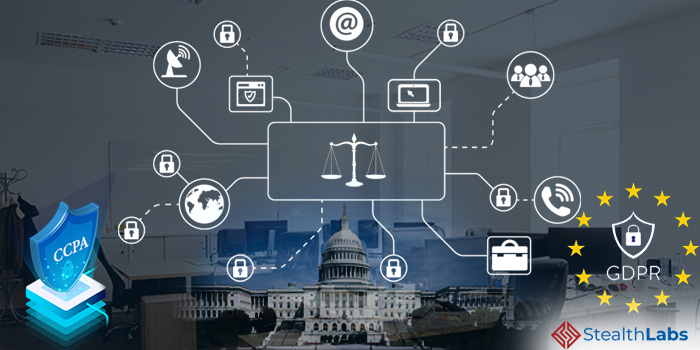Data privacy issues and corresponding regulations are some of the most significant challenges that companies face today.
In the US, 73% of consumers are more concerned about their online privacy than they were a few years ago.
Given the overwhelming importance of the data privacy issue to businesses and the pace with which it’s evolving, companies must stay abreast of regulations and consumer expectations.
Moreover, the introduction of the General Data Protection Regulation (GDPR) in 2018 has brought privacy to the forefront for both consumers and regulators. Although some US-based businesses have been following the GDPR since it was implemented, many have not.
But all the businesses need to stay informed on the privacy predictions to make the necessary changes to protect their customer’s data on par with the regulations.
Let’s glance at some of the predictions to know what is in store for the US data privacy laws in the future to steer clear from compliance fines.
Top 3 Data Privacy Trends in the US
The following are the three predictions where consumer data privacy trends are heading towards.
1) US Privacy Laws To Pick Pace

With the emergence of GDPR in 2018, the US has started developing its own comprehensive data privacy laws. These laws aim at implementing a national data privacy framework to ensure continued innovation and growth in the digital landscape while enhancing protection for consumers.
These prospective data privacy laws are focused on ensuring that US businesses continue to lead the global competitive market in the future.
However, until national laws are enacted, US businesses are supposed to comply with the patchwork of state-specific data privacy laws.
At present, all the 50 states in the US have their data breach laws.
One of the most prominent US state laws aimed at providing customers more control over their information is the California Consumer Privacy Act (CCPA). The CCPA law came into effect in California on January 1, 2020, acting as the blueprint for other bills in the US.
Following the footsteps of California, many other US states have made headway to their own privacy efforts.
Data Privacy Laws in the Other US States include
- New York Privacy Act
- Maine Broadband Data Privacy Law
- Nevada Senate Bill 220
- Massachusetts Data Privacy Law
- Maryland Online Consumer Protection Law
- North Dakota’s House Bill 1485
- Washington SB 5376
With other states in the pipeline to pass their own data breach notification laws, the US is about to witness a massive shift towards protection for consumer data and accountability for businesses that control and process it.
However, it remains uncertain whether 2020 will be the year a federal data privacy law could be enacted. Until then, the US businesses must stay compliant with their state’s data privacy laws.
2) Compliance To Become Complex

Even though many companies have already started investing massive amounts towards compliance, most are uncertain about the end of these regulatory hurdles.
GDPR, CCPA and other state-based regulations are still in their infancy stages in the US. So, businesses of all sizes must reshape their privacy safeguards before the legal, financial and reputational risks of these data privacy laws become a reality.
Even though businesses that are already GDPR-compliant will be benefited when meeting CCPA regulations, they are still obliged to fulfill the law’s unique requirements.
Moreover, the companies that have not yet undergone a digital transformation will feel the pressure to have a digital transformation and automate their processes to ensure compliance.
3) CDOs To Gain Prominence

With the onset of a more fluid data privacy landscape, the role of Chief Data Officers (CDOs) will gain even more prominence. They will be asked to take more of a role in risk and compliance management concerning the enterprise’s data use.
For instance, the CDOs can work with Data Privacy Officers (DPOs) to ensure timely, effective audit responses. Likewise, they can lead the organization in finding solutions to address the changing consumer data protection trends and data privacy regulatory requirements.
In Conclusion
The US digital businesses must stay informed about all the current global, federal and state data privacy laws as well as the prospective regulations. Your business could possibly fall victim to the non-compliance risks if you are not aware of the scale and scope of the data privacy regulations that are being implemented in the US.
So, businesses should be proactive in maintaining compliance with the current data privacy laws to gain adequate control when the time comes to comply with further statutes and regulations.
Stay Compliant, Stay Secure!
How Can Stealthlabs Help?
Stealthlabs is US-based Information security consulting provider with deep domain expertise. Our services cover almost all the prominent information security compliance frameworks including GDPR, CCPA, HITECH, PCI DSS, and NERC CIP, among others. Assess Your Data Compliance Today!
More Information Security Articles:
- Steps to Create An Information Security Program Plan
- Telemedicine and Cybersecurity: Securing Health Data!
- Infographic – Cybersecurity Myths Vs Reality
- Cybersecurity Myths and Misconceptions!
- Data Privacy Vs. Data Security: What is the Core Difference?
- 4 Ways MSSPs Can Improve Their Security Offering Through Automation
- 6 Ways To Avoid and Remain Safe From ‘Phishing Attacks’
- CCPA: Overview, Importance and Stay Complaint!
- Why Companies Need Identity and Access Management?

